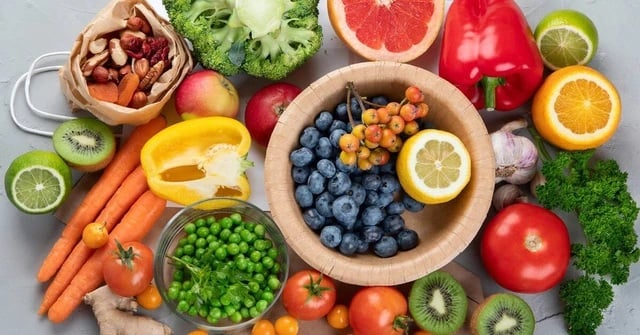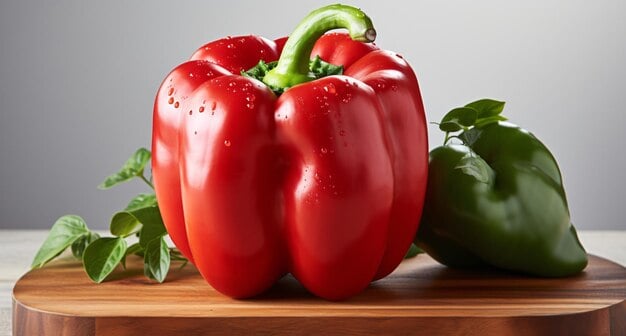1. How does vitamin C promote collagen production?
Vitamin C (also known as ascorbic acid) acts as an indispensable catalyst in the synthesis of collagen. Without vitamin C, the body cannot produce enough collagen effectively. Vitamin C not only provides indirect materials but also activates the enzymes needed for collagen synthesis, promoting production and protecting collagen fibers from damage.
Vitamin C is also a powerful antioxidant that helps protect cells, including the collagen fibers that have formed, from damage by free radicals. Free radicals are unstable molecules created by the body's metabolism or by environmental factors such as pollution, UV rays, cigarette smoke... They can break down collagen structure leading to premature skin aging, wrinkles and loss of elasticity.
According to Dr. Phuong Ho, Central Dermatology Hospital, as we age, collagen in the body will break down and collagen production will also decrease. Signs of decreased collagen production are easily seen through the following manifestations: skin lacks elasticity, is dry and wrinkles appear, joints lose flexibility...
Collagen can also be synthesized naturally in the body by combining amino acids such as proline and glycine. This process requires vitamin C and minerals such as zinc and copper.
 |
| Foods rich in vitamin C help promote the body's production of collagen. |
2. Top foods rich in vitamin C help the body produce collagen
Citrus fruits (oranges, lemons, tangerines, grapefruits...)
When it comes to foods rich in vitamin C, citrus fruits are a must. They are a rich, cheap, and delicious source of natural vitamin C.
Oranges: One medium orange provides nearly your entire daily vitamin C requirement. Oranges are also high in fiber, which aids digestion and helps control blood sugar. The flavonoids in oranges help fight inflammation and protect cells from damage.
Lemon: In addition to vitamin C, lemon also contains citric acid which helps prevent kidney stones and improves mineral absorption.
Grapefruit: Grapefruit is rich in vitamin C, vitamin A and lycopene (especially pink grapefruit), which is a powerful antioxidant. Eating grapefruit also aids in weight loss and improves heart health.
Berries (strawberries, blueberries, raspberries...)
Berries may be small but they are packed with nutrients, especially vitamin C and antioxidants.
Strawberries: High in vitamin C, just one cup of strawberries provides your daily vitamin C needs. Strawberries are also rich in fiber and anthocyanins, which help fight inflammation and protect the heart.
Blueberries: In addition to vitamin C, blueberries also rank first in antioxidant content, helping to protect the brain, improve memory and benefit cardiovascular health.
Raspberries: Like other berries, raspberries are rich in vitamin C, an antioxidant that helps reduce inflammation and protect cells.
Kiwi
Kiwifruit is a special fruit that provides an impressive source of vitamin C, which helps increase collagen synthesis in the body. According to the United States Department of Agriculture 's nutrient data, a medium kiwi (75 g) provides 56 mg of vitamin C. It also contains a large amount of fiber, which helps support digestion and overall health.
Red bell pepper
In fact, bell peppers have more vitamin C than oranges. Of all the bell peppers, red bell peppers contain the healthiest nutrients. Compared to green bell peppers, red bell peppers have nearly 11 times more beta-carotene and twice as much vitamin C.
Red bell peppers provide other important antioxidants that help protect cells from oxidative damage. These include carotenoids such as lycopene, lutein, and zeaxanthin. Red bell peppers also contain the highest amount of lycopene.
 |
| Red bell peppers are rich in vitamin C. |
Tomato
Not only rich in vitamin C, tomatoes are famous for being rich in lycopene, a powerful antioxidant that can protect skin from sun damage and reduce the risk of certain chronic diseases.
Dark green leafy vegetables (kale, broccoli...)
Dark green leafy vegetables are not only rich in vitamin C, but are also a source of other vitamins and minerals that are beneficial to health.
Kale: Contains high amounts of vitamin C, vitamin K, vitamin A, fiber and powerful antioxidants.
Broccoli: In addition to vitamin C, broccoli contains sulforaphane, a compound with anti-cancer properties. Additionally, it provides fiber, vitamin K, and several B vitamins that support bone health and energy metabolism.
According to Health & Life
Source: https://baokhanhhoa.vn/doi-song/am-thuc/202507/6-thuc-pham-hang-dau-giup-co-the-san-xuat-collagen-dba3940/





























![[Photo] National Assembly Chairman Tran Thanh Man visits Vietnamese Heroic Mother Ta Thi Tran](https://vphoto.vietnam.vn/thumb/1200x675/vietnam/resource/IMAGE/2025/7/20/765c0bd057dd44ad83ab89fe0255b783)




































































Comment (0)